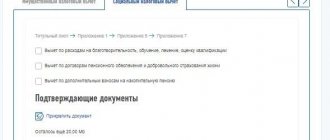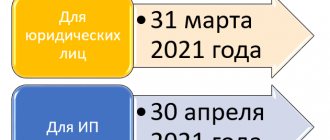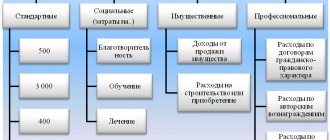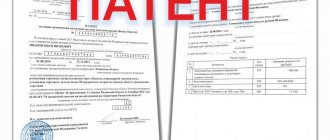Personal income tax payers
Let's start by answering the question of who are the personal income tax taxpayers. Personal income tax is paid personally (or by tax agents at the expense of taxpayers’ personal funds) by the following persons:
- individuals who are tax residents of the Russian Federation (that is, individuals who are actually in Russia for at least 183 calendar days over the next 12 consecutive months). Residents are subject to taxation on income received both in the Russian Federation and abroad.
- individuals who are not tax residents of the Russian Federation (that is, individuals who are actually in Russia for less than 183 calendar days within 12 consecutive months). For non-residents, only income received from sources in Russia is subject to taxation.
Tax base for personal income tax (what the tax is calculated on)
Personal income tax is assessed on income, which is divided into two categories: received from sources in the Russian Federation and received from sources outside of Russia. “Russian” income under personal income tax includes wages, remuneration for work and services performed in our country, dividends and interest issued by Russian companies, proceeds from the sale or rental of property located in the Russian Federation, and some other types of payments.
Prepare and submit a new 3‑NDFL form online for free
The list is open, and it contains such an item as “other income received by the taxpayer as a result of his activities in the Russian Federation.”
The list of income from foreign sources resembles the list of “domestic” income. It is also open and contains a clause on “other income”.
Filling out 3-NDFL when declaring income and filing tax deductions
The procedure for filling out 3-NDFL depends on the specific case for which you are filing a declaration. The declaration form contains 19 sheets, of which you need to fill out the ones you personally need.
- Section 1 “Information on the amounts of tax subject to payment (addition) to the budget/refund from the budget”;
- Section 2 “Calculation of the tax base and the amount of tax on income taxed at the rate (001)”;
- Sheet A “Income from sources in the Russian Federation”;
- Sheet B “Income from sources outside the Russian Federation, taxed at the rate (001)”;
- sheet B “Income received from business, advocacy and private practice”;
- sheet D “Calculation of the amount of income not subject to taxation”;
- Sheet D1 “Calculation of property tax deductions for expenses on new construction or acquisition of real estate”;
- Sheet D2 “Calculation of property tax deductions for income from the sale of property (property rights)”;
- sheet E1 “Calculation of standard and social tax deductions”;
- sheet E2 “Calculation of social tax deductions established by subparagraphs 4 and 5 of paragraph 1 of Article 219 of the Tax Code of the Russian Federation”;
- sheet J “Calculation of professional tax deductions established by paragraphs 2, 3 of Article 221 of the Tax Code of the Russian Federation, as well as tax deductions established by paragraph two of subparagraph 2 of paragraph 2 of Article 220 of the Tax Code of the Russian Federation”;
- sheet 3 “Calculation of taxable income from transactions with securities and transactions with derivative financial instruments”;
- Sheet I “Calculation of taxable income from participation in investment partnerships.”
In addition to paying personal income tax, the declaration will be useful to receive a tax deduction. By law, every citizen can return part of the tax previously paid to the state to cover the costs of education, treatment, purchase of real estate or payment of a mortgage loan. You can submit documents to receive a deduction any day after the end of the year in which the money was spent. The deduction can be received within three years.
When selling an apartment or car that has been owned for less than 3 years, fill out the title page, sheet A, sheet D2 and sections 1 and 2 of the 3-NDFL declaration.
What income is not subject to personal income tax?
Chapter 23 of the Tax Code, dedicated to personal income tax, lists income exempt from personal income tax. These include state benefits (excluding sick leave) and statutory compensation payments.
In particular, compensation related to dismissal (with the exception of compensation for unused vacation) and reimbursement of travel expenses are not subject to personal income tax. At the same time, some types of business trips are not subject to personal income tax in full (for example, travel to the destination and back), others - within a certain limit. Thus, daily allowances are exempt from personal income tax to a limited extent. For Russian business trips no more than 700 rubles. per day, for foreign ones - no more than 2,500 rubles. in a day.
The list also mentions other types of non-taxable income. We would like to add that the list is closed.
What payments and to what extent are exempt from tax?
The changes also affected areas related to the exemption from personal income tax of some incomes of people who previously contributed such a tax to the country’s budget. Thus, complete exemption occurred in relation to state benefits, with the exception of benefits for sick leave for one’s own illness or caring for a sick relative . At the same time, as before, the tax exemption for sick leave payments for pregnancy and childbirth remained.
Additional days off taken by a parent to care for a disabled child on the basis of exercising his right under Art. 262 of the Labor Code of the Russian Federation.
Pensions that were assigned by the Pension Fund of Russia, including those assigned on a labor basis (that is, upon reaching a certain length of service), as well as social bonuses to them, are also completely exempt from personal income tax.
In addition, the following compensation payments were exempted:
- for damage to health caused by any injury;
- for the free provision of housing, as well as utilities, fuel;
- for issuing allowances in kind or paying its equivalent in value;
- for the cost of equipment, equipment, sports uniforms, which are provided to athletes and judges, as well as other employees of specialized organizations during training events and competitions;
- within the framework of severance pay for heads of organizations upon dismissal in the amount of three months' earnings based on average monthly earnings (for the regions of the Far North we are talking about six times earnings), as well as within the framework of the average monthly benefit until employment (but if such benefits are paid for no more than three months in a row );
- due to the death of a civil servant or military serviceman in the performance of his direct duties;
- on the basis of the employee’s improvement of his professionalism at his own expense;
- in the case of an employee using personal property for his official purposes, if he has provided documents justifying the economic feasibility of such use;
- in connection with the implementation of direct duties stipulated by job descriptions, including if we are talking about a business trip or moving to another area where such duties will be performed;
- if we are talking about the payment of field allowance, but if such an amount does not exceed seven hundred rubles per day;
- if the payment is made for donated blood and other biomaterials necessary for life, and also if the person was awarded an honorary donor badge and receives an annual cash payment;
- if we are talking about payments to volunteers who perform their duties free of charge;
- if such payments are made within the framework of grants and awards, as well as prizes within the framework of competitions held by decision of the Government and the President of the Russian Federation;
- if bonuses for achievements in the fields of education, culture, etc. are considered as payments;
- if we are talking about one-time payments from the employer to the families where the child was born or taken into custody, or if the payment is made to the family of a deceased or retired employee;
- if the payment was made from the federal or regional budget as part of assistance to the poor and socially vulnerable members of the population;
- if payments are received on charitable grounds;
- if the payment is assigned in accordance with the norms of federal legislation, as compensation, and is made to people exposed to radiation as a result of accidents at the Chernobyl nuclear power plant, at the Semipalatinsk test site and at the Mayak enterprise;
- if the funds were transferred by the employer as compensation for sanatorium treatment or for a voucher to an employee and members of their families, if such a voucher was not purchased as part of tourist trips;
- if we are talking about scholarships and financial assistance to students and graduate students, as well as bonus payments if such persons have achieved significant success in any scientific direction;
- if the payment was made as “lift” funds as part of assistance to medical workers and education system employees with their participation in special government programs (but provided that the amount received does not exceed one million rubles), etc.
All of the income listed above has now been removed in full from the scope of the personal income tax . The entire list of income that is not subject to personal income tax is contained in Art. 217 of the Tax Code of the Russian Federation.
Personal income tax rates
The basic personal income tax rate is generally 13%. It is this that applies to income in the form of wages and in the form of revenue from business activities received by individual entrepreneurs. The same rate applies to dividends paid to residents of the Russian Federation.
Starting from 2021, the specified rate may change depending on the total amount of income received since the beginning of the tax period. If the total value is 5 million rubles. or less - the rate is 13%. If more, the bet consists of two parts. The first part is 650 thousand rubles. The second part is 15% of the total income for all bases exceeding 5 million rubles. (see “From 2021, the personal income tax rate will be increased for large incomes”).
For three types of income, the rate in any case (regardless of the amount) is 13%. This is income from the sale of real estate (except for securities) or a share in it; income in the form of property (except for securities) received as a gift; taxable payments under insurance contracts and pensions.
For some types of income, different values have been introduced. For example, for winnings and prizes in the amount of over 4,000 rubles. per year - rate 35%.
Personal income tax calculation
To calculate personal income tax, you need to determine the tax base (that is, the amount of taxable income) and multiply it by the appropriate tax rate. As a result, you will receive the personal income tax amount.
For income subject to different rates, the bases are determined separately. The tax base for dividends must be determined separately from other income. That is, when calculating personal income tax on dividends and personal income tax on wages, two different tax bases should be calculated (despite the fact that the rate for these payments is the same).
In addition, starting in 2021, separate bases should be determined for a range of income: from equity participation, lottery winnings, etc. (see “New personal income tax rate and other innovations: what awaits individuals and tax agents in 2021”). In 2021 and 2022, the tax is calculated separately for each of the specified bases. Starting from 2023, the bases must first be added, and then select a rate (13% or 650 thousand rubles + 15%) and calculate the amount of personal income tax.
The tax base is calculated on an accrual basis from the beginning of the tax period, which is equal to one calendar year. In other words, the base is determined during the period from January 1 to December 31 of the current year, then the calculation of the tax base begins from scratch.
For payments taxed at a rate of 13% (RUB 650 thousand + 15%), the residents’ base is reduced by so-called tax deductions. In this case, you need to sum up all taxable income, subtract tax deductions, and multiply the resulting figure by the rate. If it turns out that there is less income than deductions, then the base is taken equal to zero.
In this case, the negative difference between income and deductions in the general case is not carried forward to the next year, and losses from previous years do not reduce the tax base of the current period. But starting in 2021, the “unused” part of the deductions can be taken into account in the current year. This applies to social and standard deductions, as well as property deductions for the purchase or construction of housing and mortgage interest. You can reduce other income by the remainder of the deductions: from the sale of real estate; in the form of the value of property received as a gift (except for securities); taxable payments under insurance and pension agreements.
Prepare and submit 3-NDFL electronically for free
For payments taxed at other rates, tax deductions are not applied. Here, the amount of personal income tax is determined by direct multiplication of taxable income and rate. Tax deductions also cannot be applied to income from equity participation in an organization (that is, dividends received by tax residents of the Russian Federation), although the rate on them is 13% (or 650 thousand rubles + 15%).
Three payment options
1. Filing a tax return and paying taxes yourself
Every year you will need to fill out and submit a declaration and pay personal income tax by bank transfer. The declaration must contain everything
income received separately, despite the fact that every month you were busy at eight objects simultaneously.
Advantages. There is no need to open an individual entrepreneur or LLC, deal with accounting support and pay for servicing an additional bank account.
Flaws. If you have several small earnings, you will need to indicate them all in the declaration, spending quite a lot of time filling out the declaration.
2. Work under contract
When concluding an agreement with a customer, the latter will become your tax agent and pay the tax themselves. By concluding an agreement, your relationship will become official, so you can receive a certificate of income in Form 2-NDFL, which will be needed to obtain a loan or obtain a visa.
Advantages. Worries about paying taxes are completely eliminated.
Flaws. The customer has additional concerns in the form of the burden on the accountant and pension contributions. Perhaps the customer will offer you a proposal to reduce the cost of work in exchange for concluding a contract.
3. Register an individual entrepreneur
If you have a regular income working as a freelancer, from a legal point of view you can be considered an entrepreneur. In this case, you must register an individual entrepreneur.
Otherwise, you will have to pay a fine of 10% of the amount received without individual entrepreneur status, and you may also be held administratively or criminally liable for illegal business.
Advantages. As an individual entrepreneur, you have the opportunity to pay taxes under a simplified tax system at a rate of 6% instead of 13%. Maintaining records and reporting on individual entrepreneurs is quite simple due to the availability of modern services. If your budget allows, you can work with a third-party accounting department, which will handle all the accounting paperwork for you. As a rule, legal entities are willing to work with individual entrepreneurs, since the whole process is legal and easy.
Flaws. To register an individual entrepreneur, you will have to visit the tax office at your place of registration, even if you do not live at your place of registration.
Tax deductions for personal income tax
There are five types of personal income tax deductions: standard, professional, social, property and investment.
The standard deductions are listed in Section 218 of the Internal Revenue Code. According to it, all individuals with children have the right to receive a monthly deduction in the amount of 1,400 rubles. for the first child, 1,400 rubles. for the second child and 3,000 rubles. for the third and each subsequent child. “Children’s” deductions are provided up to the month in which the employee’s salary at a given employer, calculated on an accrual basis from the beginning of the year, exceeded 350,000 rubles.
Standard personal income tax deductions apply only to income received from one of the employers of the taxpayer's choice. In other words, if a person works two or more jobs, he can only take the standard deduction for one of them.
Professional deductions are available to individual entrepreneurs and those engaged in private practice. Also, the right to this type of deduction is given to persons performing work or services under contract agreements, and those who receive royalties (Article 221 of the Tax Code of the Russian Federation).
Professional deductions are equal in amount to documented expenses associated with the relevant activity. In fact, the determination of such deductions for individual entrepreneurs is similar to the determination of expenses when taxing the profit of an organization. If there are no documents confirming expenses, deductions are provided according to the standards (for entrepreneurs this is 20% of income received).
Social and property deductions for personal income tax will be of interest to those who have heard about the return or reimbursement of personal income tax - for example, about the return of personal income tax for education. Social deductions can be claimed by persons who spent money on education, treatment, charity, non-state pension insurance, voluntary life insurance and additional contributions to the funded part of a labor pension (Article 219 of the Tax Code of the Russian Federation).
Submit declarations for individual clients with a 50 percent discount Submit an application
Property deductions are provided to those who incurred costs in connection with the sale, purchase or construction of real estate (Article 220 of the Tax Code of the Russian Federation).
From January 1, 2015, the Code was supplemented with Article 219.1 of the Tax Code of the Russian Federation “Investment tax deductions”. An investment deduction is possible, in particular, in the amount of a positive financial result obtained from the sale (redemption) of securities traded on the organized market if they were owned by an individual for more than three years.
How to submit a 3-NDFL tax return through the MFC: step-by-step instructions
Currently, the service is available for multifunctional centers in Moscow and the Moscow region; in 2021, it will be possible to report for taxable income in all MFCs in Russia.
Since the service is quite new and is provided only in branches at the place of registration. To find out which MFCs you can fill out 3-NDFL, call for information, otherwise, or use your personal account on the Federal Tax Service website.
- We prepare the necessary documents according to the list.
- We make an appointment in advance, or on the general basis, on the day of application we take an electronic queue coupon.
- Together with a specialist, we fill out a tax return in the prescribed form. Submission for 2021 must be submitted by April 30, 2018, a sample and a blank form are available. Forms for 2016 and 2015 are now available. To save time, you can use specially designed examples - instructions from 2015 and 2016.
- As soon as the package of documents is ready, the MFC employee will send it to the Federal Tax Service at your place of residence, after which the procedure can be considered completed.
What documents are needed
To submit 3-NDFL through the MFC, the following documents are required (required):
- Passport of a citizen of the Russian Federation;
- Certificate confirming income from a permanent place of employment in form 2-NDFL.
Additionally:
when buying and selling real estate (if the transaction value exceeds 1 million rubles):
- Extract from the Unified State Register of Real Estate (certificate confirming property rights);
- Sales and purchase agreement;
- Transfer and Acceptance Certificate;
- If the transaction was by bank transfer - a receipt from the bank, in cash - a receipt;
- If the property was purchased with a mortgage - a loan agreement, a certificate from the bank confirming the payment of interest, and all payment receipts.
during real estate construction:
- share or investment agreement;
- receipts for payment for construction materials and additional services;
- extract from the Unified State Register of Real Estate;
- acceptance certificate, if available.
Read also: Vehicle registration
when buying and selling vehicles (if the transaction value exceeds 250 thousand rubles)
- car purchase and sale agreement.
tuition or treatment fees:
- agreement with an educational or medical institution;
- receipts and checks for payment of services;
- a copy of the student’s passport or birth certificate of a child under 14 years of age;
- a copy of the license of a medical or educational institution.
If the declaration is submitted by a third party, a notarized power of attorney is required, in accordance with Russian legislation.
How much does it cost to submit 3-NDFL through the MFC
There is no charge for the provision of services at the MFC; the declaration is submitted free of charge.
Service provision time
The procedure for compiling and submitting 3-NDFL through the multifunctional center will take 10 minutes.
When a taxpayer independently calculates personal income tax
Individual entrepreneurs and persons engaged in private practice (notaries, lawyers, etc.) themselves account for income from their activities, calculate personal income tax and pay it to the budget.
In general, those who receive income from the sale and rental of property, income in the form of winnings in the lottery or other gambling games, as well as income from any foreign sources (the latter applies only to residents) also calculate the tax themselves.
In addition, the following persons must calculate and transfer the tax to the budget with their own hands: those who received gifts from individuals who are not registered as individual entrepreneurs (with the exception of property, cars and shares donated by relatives); heirs of copyrights to works of art, scientific discoveries, etc.
Finally, individuals who received money from an employer (or other tax agent) who for one reason or another did not withhold tax are required to pay personal income tax. Tax calculations are made by tax authorities. They record the received amount in a notification that is sent to the individual. The latter can only transfer the money based on the notification received. There is no need to submit a declaration.
When a tax agent is involved in calculating personal income tax
Organizations and entrepreneurs paying wages to their employees are tax agents for personal income tax in relation to them. This means that it is employers (and not the employees themselves) who must charge personal income tax on the amount of wages, withhold the tax and transfer it to the budget. The same rule applies to dividends that the company pays to its founders - individuals.
In practice, the calculation, as well as the withholding of personal income tax and its payment are usually handled by the accounting department.
Let's give an example. Let’s say that Fedorov’s employee’s remuneration for the month worked was 40,000 rubles. Accounting calculated that the tax on Fedorov’s salary is 5,200 rubles. (RUB 40,000 x 13%*). The accountants transferred this amount to the budget, and Fedorov was given 34,800 rubles. (40,000 - 5,200).
When calculating personal income tax, the accounting department of an organization - tax agent (or individual entrepreneur - tax agent) does not take into account the amounts paid to the employee by other organizations or entrepreneurs. At the same time, in relation to your own payments, you must comply with the following condition: the amount of tax withheld should not exceed 50% of the amount of payment to the employee. Agents are required to keep records of income, deductions and withholding tax for each individual in specially designed tax registers. As a rule, form 1-NDFL is taken as the basis for such a register and information about the dates of withholding and transfer of tax to the budget is added to it.
In addition, agents must, at the request of individuals, issue them with income certificates.
Agents do not have the right to transfer tax on the income of individuals at their own expense. It is also not allowed to stipulate in contracts that the agent undertakes the obligation to pay personal income tax. If for some reason the agent was unable to withhold tax from the income of an individual, then no later than March 1 of the next year, the accountant must notify both the individual and his tax office in writing (for this, a regular income certificate in the form is used 2-NDFL).
If the agent has withheld an excess amount of tax, he must notify the employee within 10 days. He, in turn, has the right to write a return application, and the agent is obliged to return the money within three months. The refund is possible due to upcoming personal income tax payments, not only for this employee, but also for other employees of the company. In the event that this money is not enough to return, the agent can submit an application to his Federal Tax Service, and it will transfer the missing amount from the budget.
Submit all tax agent personal income tax reports online for free
Changes to the rules for payment at the expense of a tax agent
Until January 1, 2021, the tax agent was required to withhold personal income tax from its employees and deposit it into the budget. If for some reason the amount of this tax was withheld from the taxpayer incorrectly, the required amount was collected from the taxpayer himself.
From January 1, 2021, the provisions in tax legislation have changed, and now, if a tax agent incorrectly calculated the amount of personal income tax that he must withhold from his taxpayer, the agent will have to pay the missing amount independently from his own funds (according to Article 226 of the Tax Code of the Russian Federation) . In this case, the taxpayer will not have any virtual income in his accounts within the tax agent.
If the tax agent tries to withhold the difference paid, his actions may be appealed by the taxpayer, and a corresponding fine will be imposed on the responsible official of the tax agent.
Payment of personal income tax by an entrepreneur who hired employees
An individual entrepreneur who pays wages to employees acts in two capacities. He must independently calculate tax on his income, as well as withhold personal income tax from staff salaries. Thus, an individual entrepreneur is simultaneously both a taxpayer and a tax agent. Accordingly, he needs to fulfill the duties related to the calculation of “his” tax (calculate, pay to the budget and report to the inspectorate), as well as fully fulfill the duties of an agent.
When and where to transfer personal income tax
Now we’ll tell you what determines the timing of transferring personal income tax to the budget. In general, tax agents transfer personal income tax monthly no later than the day following the day the income was paid. An exception is made for vacation pay and temporary disability benefits (including for caring for a sick child). The tax withheld from these payments should be transferred to the budget no later than the last day of the month in which they were paid.
Automatically generate a tax payment invoice based on the data from the declaration and submit reports via the Internet
Income tax must be paid to the budget at the place of registration of the tax agent. If the employing organization has a separate division, then the tax from the salaries of its employees must be transferred to the budget at the location of the division. In the event that a separate division has entered into a civil contract, personal income tax on remuneration should be transferred to the budget at the location of the division. Entrepreneurs on PSN and “imputation” must transfer tax from the salaries of their employees to the place of business (and not to their place of residence).
When paying personal income tax, agents must comply with the following rule. The amount of tax exceeding 100 rubles should be transferred in the usual manner, and the amount less than 100 rubles. pay later, along with next month's tax.
Entrepreneurs and those engaged in private practice make advance payments for personal income tax three times a year. The first time - for January-March no later than April 25 of the current year, the second time - for January-June no later than July 25 of the current year and the third time - for January-September no later than October 25 of the current year. The basis for transferring personal income tax is a tax notice sent by the inspectorate. The tax authorities themselves calculate the amount of advance payments based on the declaration submitted by the entrepreneur. The total amount of personal income tax for the tax period must be transferred to the place of registration of the individual entrepreneur no later than July 15 of the following year.
Persons who independently calculate personal income tax, but are not engaged in business or private practice (landlords, heirs of copyright, etc.), do not make advance payments. They transfer money once (no later than July 15 of the following year) to their place of residence.
Fines and penalties for personal income tax
If the tax agent transferred the tax late, he is obliged to pay a personal income tax penalty for each calendar day of delay. The first day of delay is considered to be the date following the day when the employer was supposed to transfer (but did not transfer) income tax. The last day of delay is the date of tax payment.
The amount of penalties depends on the current refinancing rate of the Central Bank. Tax agents - individuals (including entrepreneurs) must pay penalties for each day of delay in the amount of one three hundredth of the refinancing rate multiplied by the amount of arrears for personal income tax.
The following rules are established for tax agents-organizations. If the delay does not exceed 30 calendar days, the amount of penalties for each calendar day of delay is one three-hundredth of the refinancing rate multiplied by the amount of arrears under personal income tax. If the delay exceeds 30 calendar days, the fines are made up of two parts. The first part is equal to one three hundredth of the refinancing rate, multiplied by the amount of arrears on personal income tax, for each calendar day of delay, starting from the 1st and ending with the 30th (inclusive). The second part is equal to one hundred and fiftieth of the refinancing rate, multiplied by the amount of arrears on personal income tax, for each day of delay, starting from the 31st.
Let us add that penalties in the amount of one three hundredth of the refinancing rate for each calendar day of delay must also be paid by those individuals who themselves transfer personal income tax from their income.
In addition, tax agents who fail to withhold tax from employee salaries and/or fail to transfer it to the budget on time will be fined by inspectors under personal income tax. The same thing will happen if income tax is withheld and (or) not transferred in full. This fine is provided for in Article 123 of the Tax Code of the Russian Federation and amounts to 20% of the amount of tax subject to withholding and (or) transfer.
It is possible that a tax agent who did not withhold personal income tax from employees’ salaries and transferred it to the budget from his own funds (except for the situation when the arrears were revealed during an audit) will also have to pay a fine under Article 123 of the Tax Code of the Russian Federation. The same applies to employers who transferred income taxes before paying out wages. Although this is not directly stated in the Tax Code, this is exactly what inspectors think. Judicial practice is contradictory. There are decisions made in favor of the Federal Tax Service (see “Arbitration Court of the Moscow Region: transfer of personal income tax by a tax agent from their own funds is not payment of tax”), but there are also decisions made in favor of employers (see “Arbitration Court: early payment of personal income tax for the tax agent's account does not result in arrears").
For entrepreneurs and individuals engaged in private practice, there is also a fine for non-payment or incomplete payment of personal income tax. The fine is 20% of the unpaid tax amount. If inspectors believe that the tax was not paid intentionally, then the amount of the sanction will be 40% of the unpaid tax amount (Article 122 of the Tax Code of the Russian Federation).
Personal income tax declaration and reporting deadlines
The most important issue for a taxpayer or accountant is the deadline for submitting personal income tax reports. Let's look at who, how and when reports personal income tax.
Entrepreneurs and individuals engaged in private practice are required to file tax returns. At the end of the year, individual entrepreneurs and private owners submit a declaration no later than April 30 of the following year. If the activity ceased in the middle of the year, the declaration must be submitted within five days from the date of termination (the tax accrued on such a declaration must be transferred no later than 15 calendar days from the date of filing the declaration).
Persons who independently calculate personal income tax, but are not engaged in business or private practice, are required to submit a declaration based on the results of the tax period no later than April 30 of the following year. In addition, those who claim social or property deductions must submit an annual declaration.
Tax agents must once a year, no later than March 1, submit to the inspectorate certificates of income for the past tax period in form 2-NDFL. In general, they are filled out for each individual who has received income from a given company or entrepreneur. In addition, tax agents are required to submit quarterly calculations in Form 6-NDFL. It includes generalized information on all individuals who received income from a tax agent. The calculation is submitted within the month following the first quarter, half year and nine months. At the end of the year, 6-NDFL is submitted no later than March 1 of the year following the reporting year.
Starting with reporting for 2021, the 2-NDFL certificate ceases to be an independent document. It becomes part of the 6-NDFL form (see “New 6-NDFL form, which includes 2-NDFL: how to fill out and when to submit”). Submission deadlines remain the same - no later than March 1 of the following year.
Keep personal income tax records in the web service, generate and submit 6‑personal income tax and 2‑personal income tax via the Internet
If a company has a separate division, then personal income tax reporting should generally be submitted at the place of registration of such divisions. Entrepreneurs who use PSN or “imputation” submit reports to the inspectorate, where they are registered at the place of business.
A tax agent who has paid income to 11 or more people is required to submit certificates in Form 2-NDFL and calculations in Form 6-NDFL strictly via the Internet. In other cases, reporting can be submitted on paper.
New opportunities for filing declarations through the MFC
From October 1, 2021, the range of regions where interaction between tax authorities and multifunctional agencies has been established has significantly expanded.
From January 1, 2021, the list of mandatory services was added to the opportunity for individuals to file a declaration in form 3-NDFL on income for the previous tax year. In order to clarify whether this service is provided in a particular region, you can contact the official website of the service and find out whether such a function is available in that region.
If such a function is provided, you must contact the appropriate department of the multifunctional center, where you can submit all the necessary documents with the help of a specialist.
You can submit a declaration by contacting the MFC in the following cases:
- if a person has registered as an individual entrepreneur;
- if the person is a lawyer and conducts legal practice;
- if the person is an arbitration manager;
- if this is a foreign citizen who has obtained a patent to work in our state (but who works for a legal entity that does not independently deduct personal income tax for all its employees);
- if a person rented out real estate or transport;
- if a person has acquired property under a gift agreement with a person with whom there is no close relationship, or with an organization;
- if there was a sale of property of large value (for example, a car or any real estate), the tenure of which was less than three years (and for almost all forms of real estate, with the exception of the above categories - less than five years);
- if the payment of wages was recorded, which, based on a court decision, is not subject to taxation.









